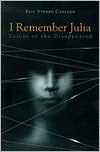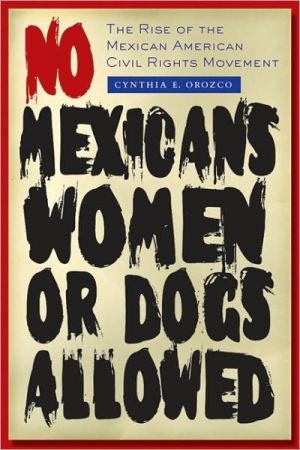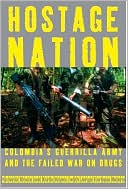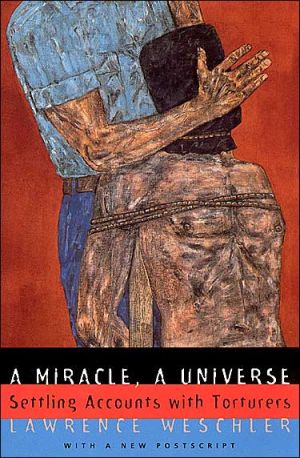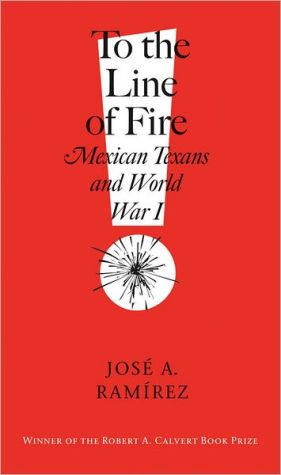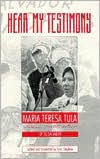I Remember Julia: Voices of the Disappeared
In 1977 "Julia" became one of the 30,000 victims of Argentina's most recent military dictatorship. Julia was a young physician and mother-to-be kidnapped from a medical clinic and found years later in a clandestine grave along with 334 other corpses. Who were those thousands of victims? Who was Julia? By reconstructing Julia's life, Eric Stener Carlson gives voice to the thousands of citizens who were "disappeared." In doing so, he must use the pseudonym "Julia" to protect the people she left...
Search in google:
In 1977 "Julia" became one of the 30,000 victims of Argentina's most recent military dictatorship. Julia was a young physician and mother-to-be kidnapped from a medical clinic and found years later in a clandestine grave along with 334 other corpses. Who were those thousands of victims? Who was Julia? By reconstructing Julia's life, Eric Stener Carlson gives voice to the thousands of citizens who were "disappeared." In doing so, he must use the pseudonym "Julia" to protect the people she left behind. Julia's poignant story is told through the emotional memories of childhood friends and family, classmates and colleagues, an ex-lover, and fellow prisoners whose lives intersected with hers in the government torture centers. Interspersed between the personal testimonies are the commentaries of a military general, a priest, a politician, a human rights activist, and a prosecuting attorney in the war crimes tribunal, giving her story a political and social context. Library Journal Between 1976 and 1982 thousands of Argentines, mostly young adults, lost their lives while being held as political prisoners by the military government. Their deaths gained international attention after the end of the military dictatorship owing in large measure to the activities of the group "Mothers of the Plaza de Mayo." In 1991, the author worked as a volunteer for the Argentine Forensic Anthropology Team, which excavated mass graves and identified victims. One of the victims, a young doctor and expecting mother, became the subject of this volume. The author spent two years interviewing family and friends in order to tell Julia's story. The result is a riveting and compelling study of a promising young Argentine whose life was cut short because she was perceived as a threat to the military government. Carlson tells a poignant and unforgettable story that is probably similar to stories of the thousands who also lost their lives during this period. It is valuable for any collection with interest in Latin America or human rights.Mark L. Grover, Brigham Young Univ., Provo, Ut.
\ Library JournalBetween 1976 and 1982 thousands of Argentines, mostly young adults, lost their lives while being held as political prisoners by the military government. Their deaths gained international attention after the end of the military dictatorship owing in large measure to the activities of the group "Mothers of the Plaza de Mayo." In 1991, the author worked as a volunteer for the Argentine Forensic Anthropology Team, which excavated mass graves and identified victims. One of the victims, a young doctor and expecting mother, became the subject of this volume. The author spent two years interviewing family and friends in order to tell Julia's story. The result is a riveting and compelling study of a promising young Argentine whose life was cut short because she was perceived as a threat to the military government. Carlson tells a poignant and unforgettable story that is probably similar to stories of the thousands who also lost their lives during this period. It is valuable for any collection with interest in Latin America or human rights.Mark L. Grover, Brigham Young Univ., Provo, Ut.\ \ \ \ \ Kirkus ReviewsA somber tale of murder and a kind of resurrection from the country that made "to disappear" a transitive verb.\ Eric Stener Carlson went to Argentina as a member of a forensics team that identified the remains of some of the 30,000 victims of the military dictatorship of the 1970s and early '80s. (That dictatorship fell following Argentina's defeat in the Falklands War.) In one of the country's estimated 340 death camps, in a graveyard "covered by years of garbage tossed over the cemetery wall by neighbors," he found a skeleton whose skull had been shattered by a shotgun blast. Thanks to the fact that her orthodontist had presciently kept records of all patients who had disappeared during the so-called Dirty War, "Skeleton\ \ \
